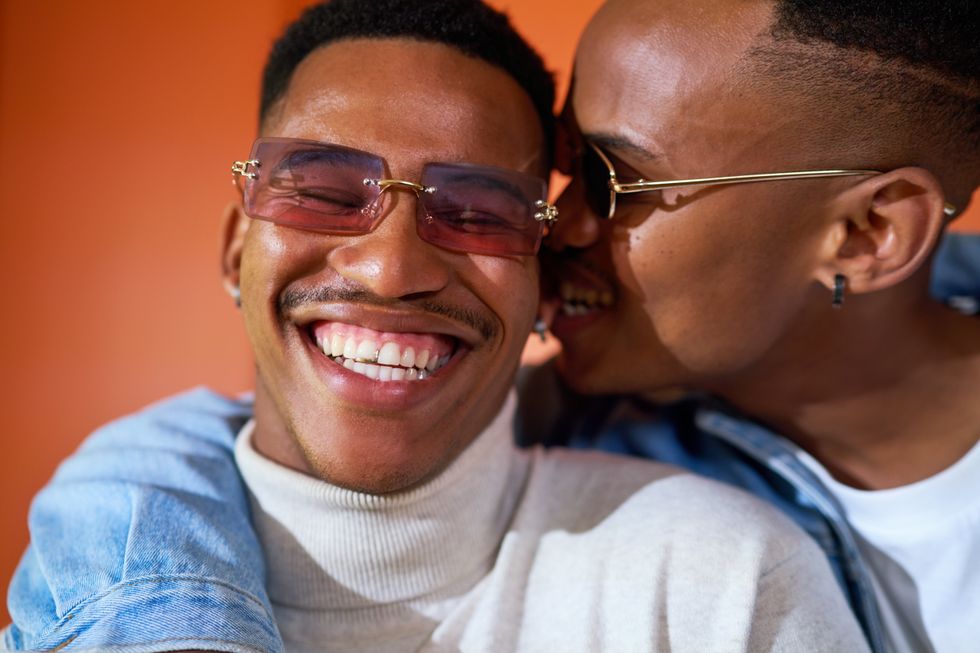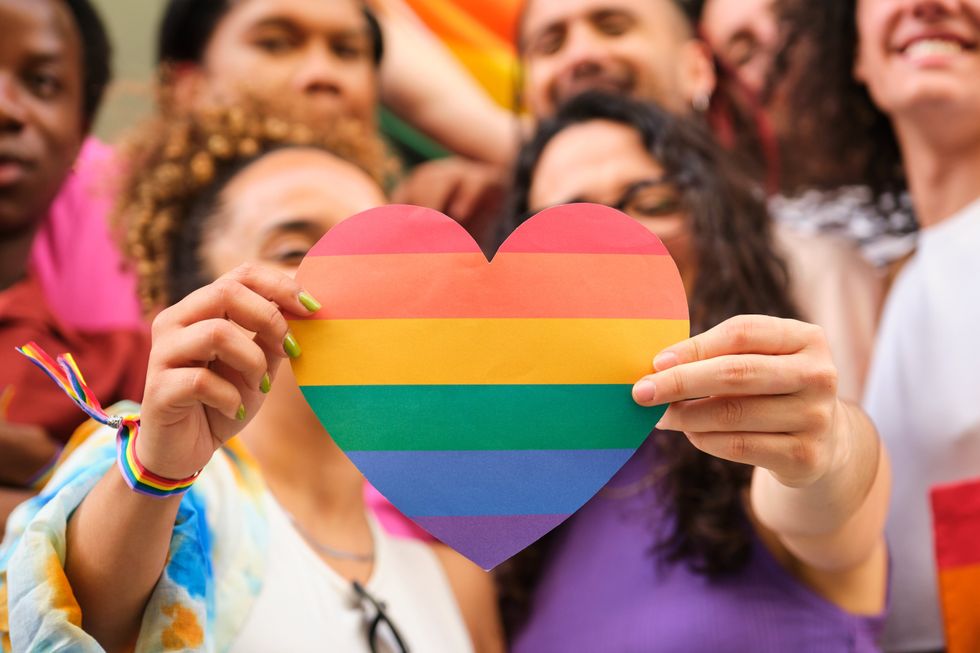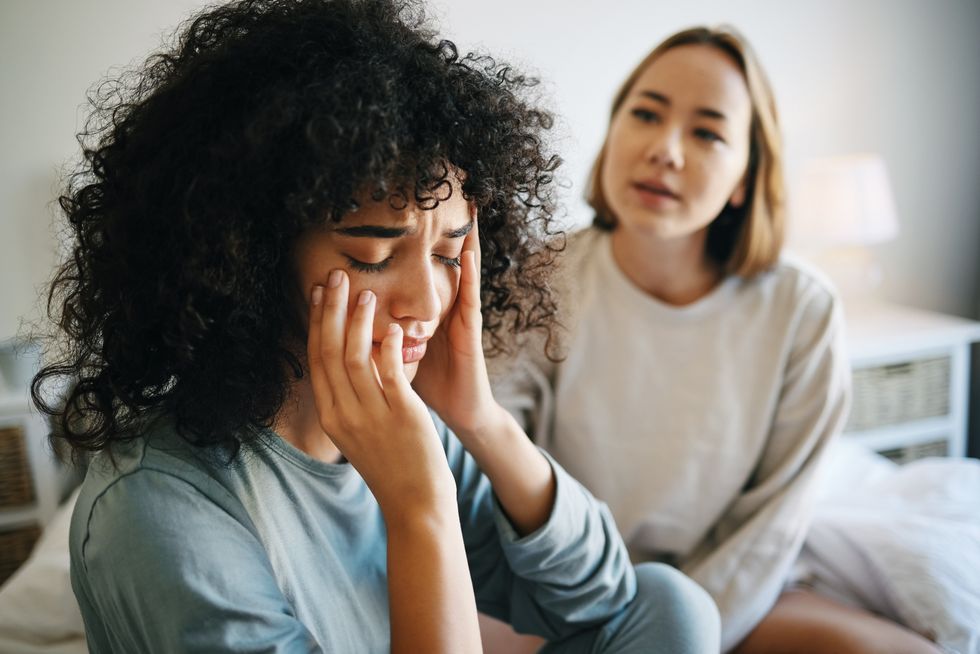Don't panic if it's been a while.

JLco Julia Amaral/shutterstock
Most of us have heard about the much-feared Lesbian Bed Death. But what exactly is it? And should you really be all that worried about?
It's just a term people use when sex slows down or stops in a long-term lesbian relationship," Leah Levi, psychologist and dating expert from Flure tells PRIDE. "It’s not as dramatic as it sounds; it’s actually pretty normal. Over time, things like busy work, stress, or life changes can shift focus away from intimacy. It doesn't mean that the relationship is falling apart or the love is gone; it’s more like a common phase in long-term relationships."
Still, It’s something a lot of us freak out about when we go a few days or a week or even a month without sex. It looms in the distance, the thing that may or may not be real, but that sure does feel real when we’re panicking about it.
Regardless of how you feel about LBD, there are definitely a few things that need to be debunked about it. So what are the most major and most ridiculous myths out there?
1. As soon as you stop having sex, you have to start freaking out about LBD.

LightField Studios/Shutterstock
So the myth goes that as soon as you’re not having sex, it’s time to panic. Why? Because you’re suffering from Lesbian Bed Death. But that might actually be counter productive Kate Logan, an associate marriage and family therapist at Gender Wellness tells PRIDE. "Anxiety is an enemy of good sex, so freaking out will likely only make things worse." However, that doesn't mean you should just ignore it either.
"If you’re concerned that your bed is about to become a memorial to the sex that once was, start by asking yourself why it’s important to you to have sex with your partner. A conversation about what you both value, enjoy, and get out of having sex can help to build intimacy and it shifts the focus from what isn’t happening to what you both want to happen," she says. "There’s often less anxiety when you both approach this issue as a team moving forward towards a shared goal, verses panicking over where you are right now."
Bottom line, just because you’re in a slower time in terms of how often you’re having sex doesn’t mean that you have something to worry about, but if you are, say so!
2. Less sex means your relationship is suffering.

OTOIMAGES/Shutterstock
Despite what the hypersexual media will tell you, not everyone is having sex 24/7. Not even queer women! We’re allowed to take a pause and to have something else become the center of our relationship, says Levi. "Having less sex doesn’t mean your relationship is falling apart. Some of the strongest, happiest couples go through seasons where sex takes a back seat to other things like careers, family stuff, or just need personal space. Love isn’t measured by how often you have sex. It’s about how you laugh together, support each other, and still enjoy being around one another," she explains.
In other words, It’s okay and it doesn’t mean you’re at a low point in your relationship.
3. Less sex means your partner is cheating on you.

Roman Chazov/Shutterstock
This is a tricky one because for many of us the moment there’s less sex in our relationships, we jump to conclusions. One super common thought is that less sex means your partner must be getting it elsewhere, so if you’re in a monogamous or exclusive relationship that must mean she’s cheating on you.
Again this kind of thinking can be really counterproductive. "Accusing your partner of cheating on you because you’re having less sex is an excellent way to ensure that you won’t have more sex anytime soon," says Logan. "If you are feeling anxious that your partner is cheating on you, it’s best to let them know how you are feeling without making accusations or assumptions."
4. Cuddling too much will kill your sex life.

PeopleImages.com - Yuri A/Shutterstock
Again, lesbians are hypersexualized to no end. We don’t exactly see many romantic portrayals of lesbians that don’t revolve around having sex constantly, and cuddling is practically a joke mean to demean queer relationships as lesser.
"That’s complete nonsense! Cuddling doesn’t kill sex; on the contrary, it helps keep the connection alive. Physical affection builds intimacy and trust, and that alone, in return, makes sex feel safer and even hotter," says Levi. "Cuddling can remind your body and brain that your partner is a secure, loving space, and that’s the best setup for real desire."
This is backed up by research adds Logan. "Research has demonstrated that cuddling is associated with higher reported sexual satisfaction and overall relationship happiness. Plus, physical affection that doesn’t come with an expectation of progressing to sex can help partners feel safe and it reduces anxiety — which as we know is the enemy of good sex!"
Cuddling is fun! It’s sweet. And if you’re into it, sometimes more than you’re into sex, it doesn’t mean anything is wrong. You can be big cuddlers and have super great sex. The two aren’t mutually exclusive.
5. It means your relationship is doomed.

Rawpixel.com/Shutterstock
So you’re convinced that you’re going through LBD. It’s okay. Seriously. Having less sex than you did when sparks were flying and everything was passion all the time doesn’t mean your relationship is over. You’re not doomed.
"Just like lots of sex does not make a relationship good, not enough sex doesn’t doom a relationship," says Logan. "Most of us were taught that sex is something that people do spontaneously when they are in love and if that’s not happening then something is wrong. In reality, couples have to intentionally cultivate a vibrant sex life together, just coasting on new relationship energy won’t last forever."
6. Strong couples never go through sexless periods.

Nuva Frames/Shutterstock
The idea that a strong, healthy couple is always made up of two super thrilled individuals who want to have sex all the time simply isn’t realistic. "Even the most in-love couples go through sexless periods. It happens. It’s okay," confirms Levi. "Being strong in a relationship doesn’t mean you have to be perfect all the time; it means you stick together, talk things through, and don't give up when things feel quiet. Those periods can make your bond stronger in the long run if you don’t chicken out."
There are highs and lows in any relationship, and as long as those lows are never too low, you have no reason to freak out. It’s really okay to have a period of time where sex just isn’t what your relationship is all about.
7. Asking for help is a no-no.

PeopleImages.com - Yuri A/Shutterstock
Wrong, asking for help is a "hell yes!" says Logan. "If sex is important then why would you deny yourself and your partner the opportunity to receive guidance on how to improve it? All too often couples spent years unintentionally making their problems around sex worse by not dealing with them effectively. Professional help and education can make a world of difference and save you from years of bad sex," she says.
In other words, needing help is not a sign of failure. If you can’t figure it out together, enlist the help of someone who can!
8. There’s only one way to have sex.

oneinchpunch/Shutterstock
Maybe you’re not having sex the way you used to. But maybe your kisses are sweeter than they used to be, or you’re really getting into X where you used to do Y. If you find yourself just having sex differently than you used to, it may be time to re-define your understanding of sex so that, for example, what once was foreplay is the main event. "Sex doesn’t have to look one certain way. It’s not all about wild, movie-scene hookups. It can be soft or rough; with lights on or without; with foreplay or without – whatever feels right for you and your partner. There’s no rulebook for what intimacy has to look like, and that’s the beauty of it," says Levi.
Logan agrees. "There’s no rulebook for what intimacy has to look like, and that’s the beauty of it, in my opinion. I think this system of thinking only puts more limitations on your sex life."
So it may just be that your sex lives are changing and growing, and that’s totally great! There are so many different ways to have sex, and only you can define sex for yourself.
9. You’re officially a stereotype.

LightField Studios/Shutterstock
Because of the marginalization faced by lesbians and other queer women, sometimes the pressure to not be a stereotype is way too intense. While Logan acknowledges the LBD stereotype she says its one she says we can let go of. "LBD may be an enduring stereotype, along with the Subaru and the U-haul, it’s not exactly true," she explains. "The truth is that frequency of sex tends to decline over time for all long-term couples not just lesbians." Plus, she adds, the research about lesbian sex, is actually counter to the whole LBD narrative. "Lesbian couples tend to report very high levels of sexual satisfaction. So, it seems that perhaps lesbians have better quality sex than everyone else, which could be a fun stereotype to replace the outdated bed death myth with."
10. It’s someone’s fault.

Srdjan Randjelovic/Shutterstock
When people in a sexual relationship stop having sex, it’s all too easy to point fingers. At each other. At work. At other people. Sometimes you’re just on a new medication that takes down your sex drive, or you’re just way too tired, or you just really don’t feel like it.
Levi counsels against falling into that blame game trap. "Now look, I know it’s easy to blame yourself or your partner when things slow down. In reality, no one’s really at fault. Instead of pointing fingers, it’s better to stick together as a team and figure it out. Blaming each other won’t help, but working through it together will," she says.
Ultimately, you don’t need an excuse to choose not to have sex, and you don’t need an excuse for being in a relationship that is sexless, temporarily or permanently. As long as you feel happy, loved, and cared for in your relationship, there’s no one out there you have to impress with scandalous tales of what goes on in your bedroom.
11. It means you have to break up.

NDAB Creativity/Shutterstock
So your sex life has hit a major dry spell, does it mean you have to break up? Not necessarily says Logan. "Sex is a really important part of many peoples lives and relationships and while it should not be discounted or undervalued, that does not mean that sexual problems mean the end of a relationship," she explains. "Just like anything else, sometimes couples make a genuine effort to address this problem and still come to the conclusion that they need to go their separate ways. But a lack of sex isn’t a unique special issue that cannot be overcome, it’s actually quite common and many people find ways to reconnect and have even better sex than they had before they went through their dry spell.
Ultimately, how you choose to handle a period of less or no sex is your call, point blank. Maybe you’ll choose to see a sex therapist. Maybe you’ll try new ways of having sex. Maybe you will break up. But the most important thing here is that you’re doing what’s right for you, and if you love each other, are invested in your relationship, and don’t have any interest in breaking up, maybe ending things just isn’t in the cards for your relationship. Only you can make the decision.
Experts cited:
Leah Levi, psychologist and dating expert from Flure
Kate Logan, AMFT (associate marriage and family therapist) at Gender Wellness Los Angeles








































































 Peopleimages.com - Yuri A/Shutterstock
Peopleimages.com - Yuri A/Shutterstock